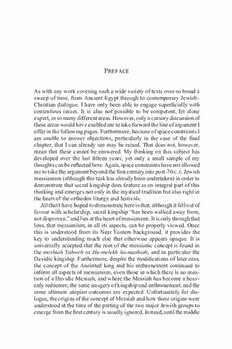
Concept of the Messiah in the Scriptures of Judaism and Christianity PDF
244 Pages·2011·1.685 MB·English
Most books are stored in the elastic cloud where traffic is expensive. For this reason, we have a limit on daily download.
Preview Concept of the Messiah in the Scriptures of Judaism and Christianity
Description:
In this title, Shirley Lucass examines the history of the concept of messiah in biblical, and post-biblical traditions. For 2000 years, Judaism and Christianity have been at odds with one another. The problem at the heart of the division is the concept of messiah. Shirley Lucass looks directly at the concept of messiah from an historical perspective and examines its roots in ancient Jewish literature, and its development within the Christian tradition, aiming not only to trace the biblical and extra-biblical developments of the concept, but to outline a platform for religious dialogue. Lucass begins with a survey of methodological approaches, and then moves on to consider the origins of the messiah concept in ancient near eastern kingship, the 'anointed' in the Second Temple period and the messiah as outlined in the New Testament and in post 70 CE Messianism. Lucass contends that the New Testament concept of messiah is not inconsistent with, nor incompatible with the Jewish antecedent traditions, and it is this conclusion which enables her to present a valuable chapter on the implications of this study for inter-religious dialogue. The Library of Second Temple Studies is a premier book series that offers cutting-edge work for a readership of scholars, teachers, postgraduate students and advanced undergraduates in the field of Second Temple studies. All the many and diverse aspects of Second Temple study are represented and promoted, including innovative work from historical perspectives, studies using social-scientific and literary theory, and developing theological, cultural and contextual approaches.
See more
The list of books you might like
Most books are stored in the elastic cloud where traffic is expensive. For this reason, we have a limit on daily download.
